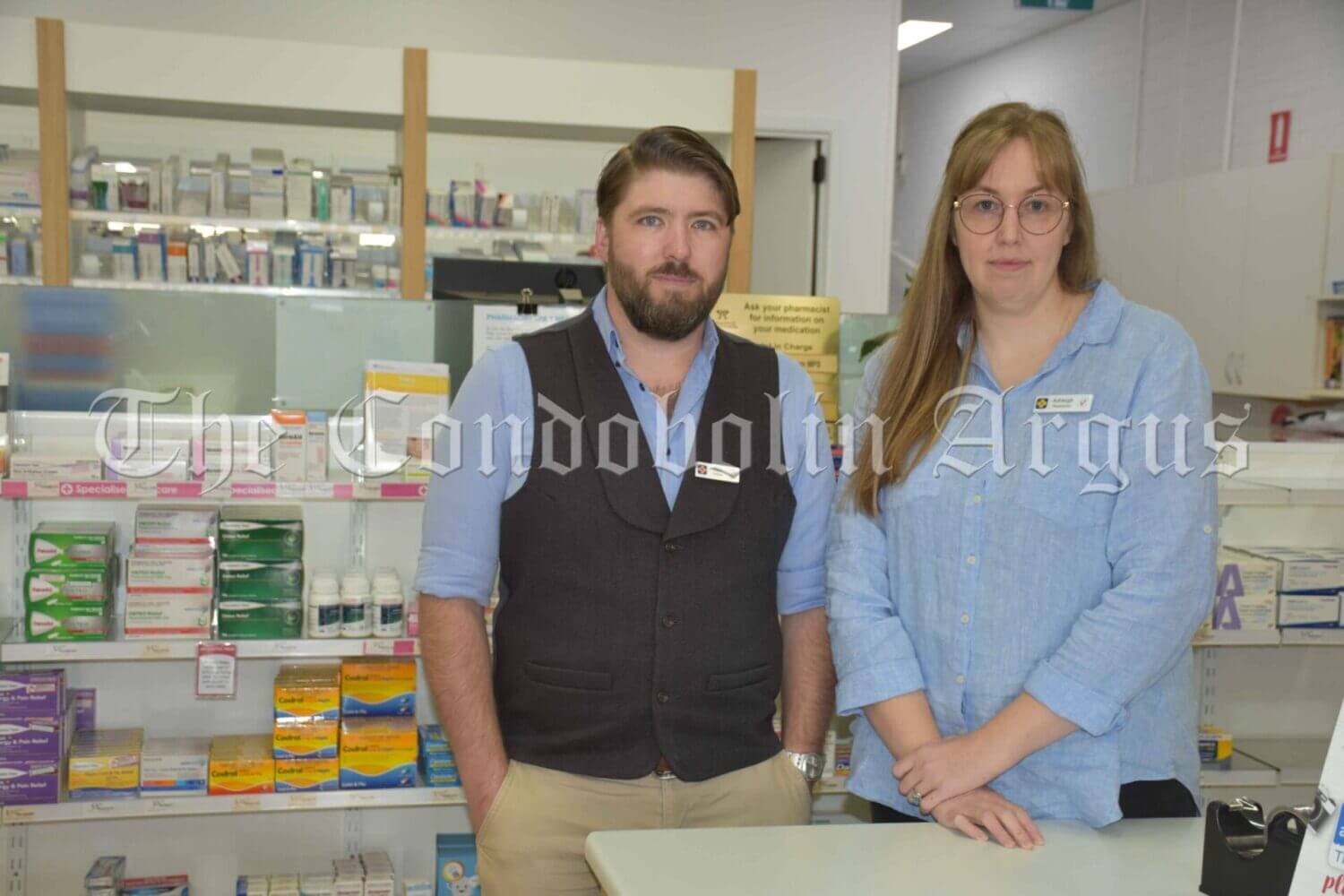POLICY CHANGE TO HURT PHARMACY AND THE COMMUNITY
On face value the Federal Government’s decision to allow millions of Australians to buy two month’s worth of medicine for the price of a single prescription looks like good policy – but venture beyond the headlines and it becomes apparent this decision will have very big ramifications for Shortis and Timmins Pharmacy as well as their industry colleagues.
Once fully implemented, the 60-day prescribing policy will provide doctors with the option to prescribe a two-month supply of more than 320 medicines on the Pharmaceutical Benefits Scheme (PBS) to Australians with stable, ongoing conditions. The current dispensing limit is for a one-month supply only.
Pharmacists Dave and Ashleigh Rees have described the Federal Government’s decision as a “kick in the teeth” and are beyond frustrated by the lack of consultation in regard to a policy that will affect local patients.
They believe that 60-day dispensing will ultimately hurt all pharmacies.
“These changes limit/reduce our ability to provide free/subsidised services,” they explained.
“It will mean increased (or introducing) prices for things like blood pressure checks, vaccinations, deliveries, webster packs, even having a pharmacist available to talk to. It may mean in future we will have to send patients back to their GP when there is an issue with a script, instead of liaising with the doctor to fix it for them. We may have to reduce the number of pharmacists we have on duty at one time, thereby reducing our ability to deliver services.
In Condobolin, these changes will make the cost of providing medication services to the Retirement Village (William Beech Gardens) unviable. That service is currently offset by the dispensing fees Shortis and Timmins Pharmacy receive and if the changes proceed as planned, they will have to renegotiate with the facility, adding to their costs.”
It will also mean it will not only cost more to keep more medicines behind the counter, but pharmacies will be paid less as their dispensing fee will be effectively halved. Then there is the very real likelihood of medicine shortages.
“Medicines shortages will worsen. The medication shortages we are seeing are the worst they have ever been,” Dave and Ashleigh said.
“Although the same number of medicines will be dispensed over time, when there is a shortage, more people will miss out and there is no way for us to hold medication back if someone has a script for 60 days’ worth.
“It may mean situations where some people get two months’ worth of medicines and others miss out. When this occurs, due to the reduced availability of the pharmacists, we may not be able to help and have to send people back to their doctors, placing further unnecessary burden on the health system.”
The medical risks for allowing patients double dosages of their medicines at home is a real consideration.
“There will also be an inevitable increase in wasted medicines and risk of what is known as medication misadventure (mistakes being made with medication),” Dave and Ashleigh advised.
Ultimately, Dave and Ashleigh believe it will be the community who will suffer because of these proposed changes.
“The people that rely on free and/or cheap access to services in the pharmacy will be the ones affected most. Some people will be better off in terms of reduced costs and visits to the pharmacy, but this will come at the expense of those who need the most help in our community,” they said.
“If we are offering less help and services, this in turn puts more pressure on local GPs that in turn may put more pressure on the hospital system.”
Ultimately there will have to be cost cutting measures implemented to offset the proposed changes, and this is weighing heavily on Dave and Ashleigh’s minds.
“At the end of the day, it will simply mean we can’t help people in the same way we do now, unless they pay for that help,”
“After everything we have been through since the start of the covid-19 pandemic, it feels like a kick in the teeth and makes us sick to our stomach to contemplate making these decisions.”
The Pharmacy Guild of Australia says Federal Health Minister Mark Butler has refused to provide a guarantee that no patient and no community pharmacy will be worse off under the Government’s 60-day medicine policy.
Pharmacy Guild economic modelling, using data provided by the Department of Health, shows this policy will cut $3.5 billion in patient care to communities around Australia over the next four years.
This $3.5 billion cut is made up of a $1.2 billion saving to the Budget in Government dispensing fees, with community pharmacies expected to pay for a further $2.3 billion in patient fees for the policy.
National President of the Pharmacy Guild of Australia Trent Twomey said the Government needed to return $3.5 billion to community pharmacies or millions of patients would miss out on care and medicines.
Mr Twomey added Mark Butler also refused to guarantee there would be no medicine shortages under his policy.
According to the Federal Government, from 1 September, general patients will be able save up to $180 a year if their medicine is able to be prescribed for 60 days, concession card holders will save up to $43.80 a year per medicine.
Introducing 60-day prescribing for stable, ongoing conditions was a recommendation of the clinical experts at the independent Pharmaceutical Benefits Advisory Committee (PBAC) in 2018.
The PBAC considered the safety profile of the medicines that it recommended, and doctors will make a clinical decision about whether 30-day or 60-day prescribing is appropriate for the individual circumstances of the patients they treat.
The change will bring Australia into line with New Zealand, the United Kingdom, France and Canada, where patients already have access to multiple month medications on a single prescription.
Mr Twomey said the Government was quick to say their policy copied the same approach overseas in the UK, New Zealand and Wales but doesn’t outline the facts.
“In Wales, the Government guaranteed the viability of community pharmacies to stop mass closures and we would like the same guarantee from our Federal Government.”
The Australian Patient’s Association has expressed caution regarding the plans of the Albanese Government to extend medication supply from the usual 30-day supply per prescription.
The APA’s Ambassador for Health Reform, Doctor Nick Coatsworth, said that the APA welcomes consumer cost savings and easier access to medicines, which have a strong appeal to many consumers, but there are several factors which, if not addressed in implementation, could produce some poor outcomes for patients.
“The main benefit of these changes would be that patients with longer term drug prescriptions would reduce the number of visits to their pharmacy and make subsequent savings as well in dispensing fees.” he said.
“However, we’re concerned about the implementation of this policy, and the detail is important. For example, currently, large numbers of drugs are in short supply, and these changes could lead to patients missing out on medications due to those shortages. We already have supply chain weaknesses, demonstrated across a range of common medications during the pandemic, and many are still to be resolved. Supply chains need to be consistent enough to ensure longer supply to individual patients and build the extra quantum of available drugs in the marketplace” he said.
“Secondly, the experience of other countries suggests that we can expect increases of hoarding of drugs by consumers, increasing numbers of tablets being stored in cupboards, which coincides with increases in medication errors. Overflowing home medication cupboards are a safety hazard. Imagine the grandchildren coming around and getting into a cupboard with 450 pills in it” he said. “We accept that this may be a cost of the changes, but we would like to look at how we can mitigate against the problem.”
“It also appears from the current government messaging, that pharmacies will have to bear some of the costs of the savings which have been declared. The savings in costs to consumers is a fantastic outcome, but if that is only partly absorbed by government and passed on to pharmacies, the potential here is that smaller pharmacies will be under pressure. The last thing we want is the loss of pharmacies, which would mean that access for patients is disrupted, and if there are problems in this area, the worst of them will likely be in rural and regional Australia.”
Latest News
Merit winners for week 11
Congratulations to the Tullibigeal Central School Merit Award Winners for [...]
CJCA players recognised for their efforts
Condobolin Junior Cricket Association held their annual Presentation Day at [...]
Condobolin Public School commemorates
On Thursday, 11 April Condobolin Public School held their ANZAC [...]
Cross Country 2024
On Friday 12th April, Trundle Central School held their annual [...]
Competing in the PSSA NSW State Swimming Championships
A massive congratulations to Tullibigeal Central Schools super fish, Veritty, [...]
Managing canola pests using beneficial insects
Australian grain growers will benefit from improved pest management strategies [...]










